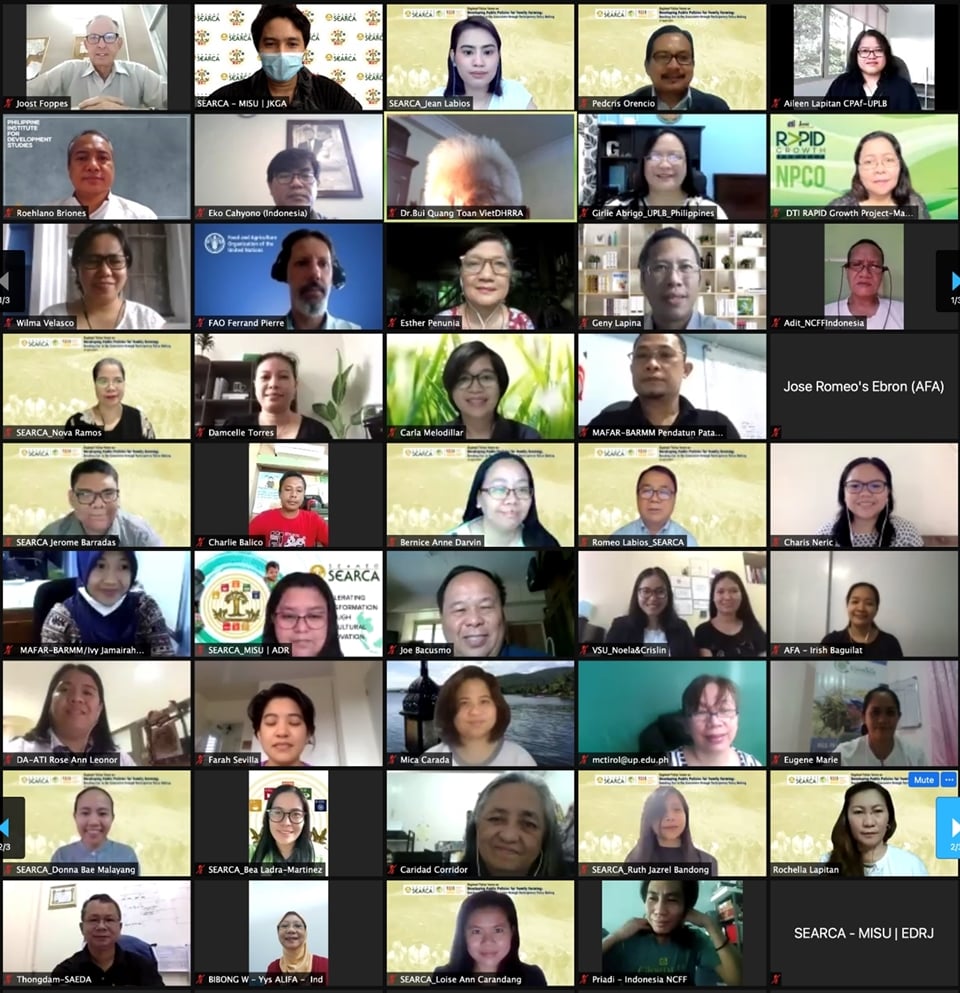
April 27, 2021- The regional policy forum on Developing Public Policies for Family Farming: Reaching Out to the Grassroots through Participatory Policy Making has highlighted the need of engaging stakeholders and implementing participatory processes in policymaking to support and strengthen family farming in the Southeast Asian region. Conducted as part of the United Nations Decade of Family Farming (UNDFF), this event was led by the Southeast Asian Regional Center for Graduate Study and Research in Agriculture (SEARCA), in partnership with the Asian Farmers' Association for Sustainable Rural Development (AFA) and the Food and Agriculture Organization of the United Nations (FAO).
In his welcome remarks, Dr. Glenn B. Gregorio, SEARCA Director, stressed the significant role played by family farmers in the region in assuring food security, livelihood development, and environmental protection, especially in rural areas.
Dr. Pedris M. Orencio, SEARCA’s Head of Research and Thought Leadership Department (RTLD), then presented that there are emerging challenges that family farming face which can be addressed by creating policies and programs formulated with insights and participation among various stakeholders. Hence, this Forum aimed to be a platform to co-identify the enabling factors and constraints to participatory policymaking concerning family farming in Southeast Asia.
The forum was divided into five sessions: (1) Participatory Policy Making in the context of Family Farming in Southeast Asia; (2) Participatory Policy Making in Southeast Asia: Selected Country Cases; (3) Development of the UNDFF National Action Plans: Lessons, Gaps, and Bottlenecks; (4) Breakout; and (5) Plenary.
In the first session, Ms. Ma. Estrella Penunia – Banzuela, Secretary-General of AFA, centered her keynote message in the first pillar of UNDFF on providing enabling policy environment, which she emphasized should include inclusive and effective governance with family farmers from national down to local scales. This was echoed by the succeeding sharing of Mr. Charlie Balico, Representative of the AFA Young Farmers Committee, who stressed the need to continue lobbying for policies (e.g., National Young Farmers’ Roadmap) that recognize the strategic role of young farmers for agricultural development.
Three country-specific cases on participatory policy planning on family farming were presented during the second session including: (1) the public policy advocacies to strengthen basic rights of fishing communities in family farming in Indonesia as presented by Mr. Eko Cahyono of Sajogyo Institute (SAINS); (2) an analysis of people’s participation in the Philippine’s Magna Carta for Small Farmers as discussed by Prof. Aileen V. Lapitan of University of the Philippines Los Baños (UPLB); and (3) the development and progress on public policy for family farming in Vietnam as imparted by Dr. Dao The Anh of the Vietnam Academy of Agricultural Sciences (VAAS).
The third session involved sharing of experiences, lessons, gaps, and bottlenecks in the development of the UNDFF National Action Plans in selected Southeast Asian countries. Speakers included Ms. Ika Krishnayanti of the Indonesian Farmers Alliance (API) for Indonesia; Ms. Rose Ann Leonor of the Department of Agriculture’s Agricultural Training Institute (DA-ATI) and Mr. Raul Socrates Banzuela of the Pambansang Kilusan ng mga Samahang Magsasaka (PAKISAMA) for the Philippines; and Mr. Joost Foppes FAO Consultant for Lao PDR.
The participants were then divided into four breakout groups. Groups 1 and 2 were composed of Philippine participants while Group 3 was for Indonesia and Group 4 was for Mekong Delta countries (i.e., Cambodia, Lao PDR, Myanmar, Vietnam, and Thailand). The discussions allowed forum participants to further gauge the current farming families’ awareness, understanding, and participation in policy development; existing systems that support participatory policymaking; and issues confronting family farmers in the region among many others. The groups were then asked to present their outputs during the Plenary session.
In his synthesis, Dr. Orencio emphasized that successful public policy processes must be inclusive and focused on agricultural transition and that it must respond to the current issues in the agricultural sector to ensure wellbeing of farming families. Based on the discussions, Dr. Orencio outlined key points to consider to successfully move forward such as strengthening capacities of family farmers, leveraging on existing mechanisms, and improving trust and representation in policy development activities.
Overall, these learnings are expected to serve as critical inputs for the development of recommendations to promote participatory processes in public policy development. This is also a response to the call for more coherent, cross-sectoral, and collective actions to realize the full potentials of the UNDFF in addressing the economic, environmental, and social dimensions of agricultural development. Specifically, SEARCA, will publish a policy brief and the forum proceedings that could guide governments and organizations in formulating programs and policies for family farming in the region.
The forum was participated by representatives from the academe, research and development institutions, government agencies, farmers’ and civil society organizations, and family farming groups in Southeast Asia.